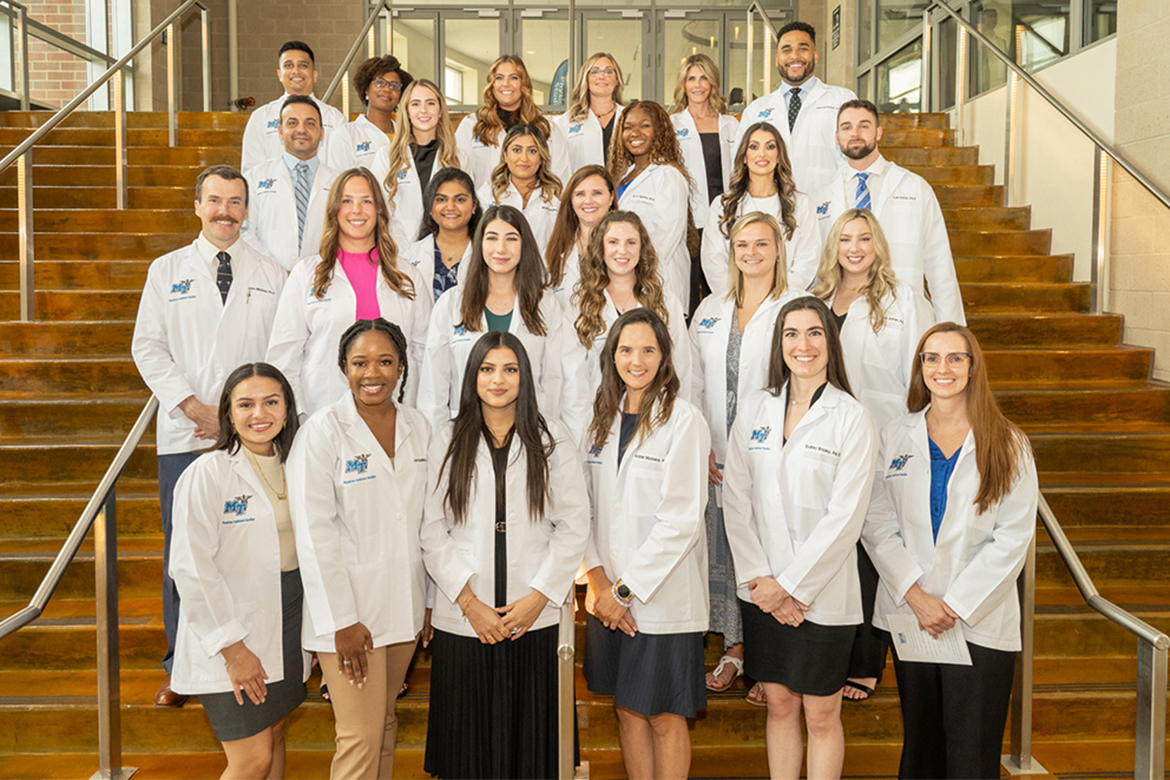
Physician Assistant Studies
Become a Physician Assistant in the most cost effective program in Tennessee. Start your journey today!
Physician Assistant Studies, M.S.
The Physician Assistant Program of the College of Behavioral and Health Sciences at MTSU is a 27-month-long rigorous program. As the least expensive Physician Assistant Program in the State of Tennessee, we admit one cohort annually in May. Applications open in Centralized Application Service for Physician Assistants (CASPA) annually in late April.
The degree awarded is a Master of Science in Physician Assistant Studies (M.S.). This degree aligns with the institutional mission and provides the necessary educational credential for licensure to practice in one of the fastest-growing occupational sectors in Middle Tennessee. With a growth rate of 42 percent and one-third of all PA positions in Tennessee located in the Nashville-Murfreesboro-Franklin area, this program helps meet employer demand and societal need for access to health care. The Master of Science in Physician Assistant Studies (M.S.) degree is designed to provide students with the didactic education, clinical training, and educational credentials necessary to take the Physician Assistant National Certifying Examination (PANCE) and obtain licensure to practice as Physician Assistant (PA).
Informational Session
Join us on April 9, 2025, at 6:00 pm CST via Vimeo for a Physician Assistant Studies informational session, hosted by Dr. Candace Whitley, Admissions Coordinator. The session will be recorded for future viewing.
ARC-PA Accreditation Status
The ARC-PA has granted Accreditation-Provisional status to the Middle Tennessee State University Physician Assistant Program sponsored by Middle Tennessee State University.
Accreditation-Provisional is an accreditation status granted when the plans and resource allocation, if fully implemented as planned, of a proposed program that has not yet enrolled students appear to demonstrate the program’s ability to meet the ARC-PA Standards or when a program holding Accreditation-Provisional status appears to demonstrate continued progress in complying with the Standards as it prepares for the graduation of the first class (cohort) of students.
Accreditation-Provisional does not ensure any subsequent accreditation status. It is limited to no more than five years from matriculation of the first class. The program’s accreditation history can be viewed on the ARC-PA website at http://www.arc-pa.org/accreditation-history-middle-tennessee-state-university/.
About our Program
Mission Statement
The mission of the MTSU PA Studies Program is to provide comprehensive innovative medical education of the highest quality to prepare a diverse community of Physician Assistants to thrive as compassionate and collaborative members of the healthcare team with a commitment to community service and increasing access to care.
Vision
The MTSU PA Studies Program will be a leading educational program with national recognition for excellence in service-learning, quality and compassionate healthcare, and increasing access to care to diverse populations.
Goals
Competencies
Medical Knowledge
- Apply established, fundamental scientific principles to patient care.
- Apply the clinical sciences to diagnostic and therapeutic decision-making.
- Apply an epidemiological approach to population health by understanding risk factors, disease prevention, and health promotion for various patients and populations.
- Analyze the impact of social-behavioral sciences on the delivery of healthcare to diverse patient populations.
- Use medical knowledge to distinguish normal/abnormal growth and development to guide investigatory approaches to patient evaluation.
- Gather and critically appraise evolving bio-medical knowledge to promote evidence-based clinical practice to contribute to the fund of new knowledge and literature.
Interpersonal Skills
- Create and sustain a meaningful and therapeutic relationship with patients and families through effective communication and exchange of information.
- Adapt communication style and messages to the cultural and socioeconomic context of the interaction.
- Apply emotional resilience and stability, adaptability, flexibility, and tolerance.
- Demonstrate compassion, sensitivity, and honesty within the context of difficult medical conversations.
- Communicate effectively, work collaboratively, and facilitate conflict resolution with physicians and other health care professionals as both a leader and member of a health care team to promote a climate of mutual respect and trust.
Clinical and Technical Skills
- Ellicit a history and perform an appropriate physical exam for ages across the lifespan, regardless of presentation or setting.
- Perform diagnostic and therapeutic procedures considered essential for entry into the clinical practice as a PA.
- Compose basic counseling and patient-centered education which is culturally focused.
- Demonstrate the use of clinical equipment for the diagnosis and management of disease.
- Accurately and adequately provide comprehensive documentation regarding care for medical, legal, quality, and financial purposes in a timely manner.
- Provide concise oral case presentations appropriate for the audience and context of the presentation.
Clinical Reasoning & Problem Solving
- Demonstrate investigative and analytic thinking approach to clinical situations.
- Compare and contrast normal and abnormal health states.
- Discern between acute, chronic, and emergent disease states.
- Apply advanced critical thinking skills to evaluate sources of information including discerning between important and extraneous information.
- Synthesize and prioritize therapeutic actions and clinical care decisions based on medical knowledge, available information, and the urgency of presentation.
Professional Behaviors
- Demonstrate an awareness of and responsiveness to the larger system of health care to provide patient care that balances quality and cost, while maintaining the primacy of the individual by providing comprehensive and personalized healthcare in a system-based practice.
- Demonstrate professionalism through strict adherence to the standards of the PA profession and devotion to the medical, ethical, legal, and fiscal foundations of healthcare by:
- Maintaining professional relationships with patients, patient’s families, and all members of the healthcare team.
- Understand the role of the physician assistant in the delivery of healthcare, including demonstrating self-awareness and the recognition of personal/professional limitations and humility in the ability to seek help.
- Maintain a commitment to patient safety through prevention of medical errors, quality improvement, and risk management.
- Promote cross-cultural and socioeconomic sensitivity, confront prejudice, and support the development of effective medical practice in a diverse society.
- Engage in critical analysis of their own practice experience for the purposes of self- and practice-based learning and improvement.
- Exhibit attributes of engaged citizenship and community service through active involvement in community and population health.
Student Attrition Information
NCCPA PANCE Exam Summary Report
Read More FAQs
Additional links
- Student Handbook
- Index of ARC-PA Standards
- American Academy of Physician Associates
- Tennessee Academy of Physician Assistants
- National Commission on Certification of Physician Assistants
- Accreditation Review Commission on Education for the Physician Assistant
- Centralized Application Service for Physician Assistants (CASPA)
News Briefs

MTSU Physician Assistant program hosts inaugural ‘white coat’ ceremony [+VIDEO]
Middle Tennessee State University’s first cohort of Physician Assistant Studies students and their families gathered Friday, Aug. 11, to celebrate a milestone with the inaugural “white coat” ceremony that symbolizes the next step in their academic careers. “This is a huge transition for them,” Marie Patterson, PA program director, told the crowd gathered in the [ Read More ]

February ‘Out of the Blue’ has a heart for physicians’ assistants, Black History Month, adult learners
The February edition of Middle Tennessee State University‘s “Out of the Blue” TV magazine show is showing the love for the university’s new Physician Assistant Studies Program to help keep Tennessee in good health, spreading the love for American history by getting out the word on the 2023 events marking Black History Month at MTSU, [ Read More ]
News Briefs

MTSU Physician Assistant program hosts inaugural ‘white coat’ ceremony [+VIDEO]
Middle Tennessee State University’s first cohort of Physician Assistant Studies students and their families gathered Friday, Aug. 11, to celebrate a milestone with the inaugural “white coat” ceremony that symbolizes the next step in their academic careers. “This is a huge transition for them,” Marie Patterson, PA program director, told the crowd gathered in the [ Read More ]

February ‘Out of the Blue’ has a heart for physicians’ assistants, Black History Month, adult learners
The February edition of Middle Tennessee State University‘s “Out of the Blue” TV magazine show is showing the love for the university’s new Physician Assistant Studies Program to help keep Tennessee in good health, spreading the love for American history by getting out the word on the 2023 events marking Black History Month at MTSU, [ Read More ]
Related Media
Physician Assistant Studies, M.S.

MTSU’s Career Development Center
MTSU offers a comprehensive Career Development Center that serves students throughout the full student experience and beyond. They collaborate with faculty and staff to equip students with the tools to be marketable to the world of work and continuing education.
Students can schedule an appointment or check online resources and job boards at mtsu.edu/career.
Students can find current internship opportunities by talking to faculty and visiting the University job and internship board called Handshake.
Wondering what you can do with your major? Check out our What Can I Do with A Major In guides.



Physician Assistant Studies Program
 Admissions in CASPA for 2024-2025 have closed.
Admissions in CASPA for 2024-2025 have closed.
Fill out the CASPA Application
Application Procedures
Applicants must apply to the program through the Centralized Application Service for Physician Assistants (CASPA) to be considered for admission. Students must submit the appropriate CASPA and MTSU applications fees to be considered. If selected for an interview, students may be asked to complete an additional, abbreviated application form through the College of Graduate Studies.
Physician Assistant Student Technical Standards
Professional healthcare clinicians are challenged in environments that demand certain abilities, behaviors, and skills. The Physician Assistant must have the knowledge and skills to function in a broad variety of clinical situations and to render a wide spectrum of patient care. Students must be able to integrate all information received by whatever sense(s) employed, consistently, quickly, and accurately, and they must have the intellectual ability to learn, integrate, analyze, and synthesize data. A student for the Physician Assistant profession must have abilities and skills including observation, communication, intellectual, motor, conceptual, integrative, and quantitative, and behavioral and social. To be eligible to enroll in the program, the student must be able to perform these skills and behaviors successfully either unassisted, with dependable use of reasonable assistive devices, or by employing another reasonable accommodation. The following descriptions define the capabilities expected from an individual to successfully complete the Middle Tennessee State University Physician Assistant Studies Program.
General Abilities
The PA student must possess the skills related to critical thinking, communication, gross motor dexterity, fine motor coordination, interpersonal skills, observational abilities, and social skills in an individual, group, classroom, laboratory, or other educational setting. The student is expected to possess functional use of the senses of vision, touch, hearing, taste, and smell. All data received by the senses must be integrated, analyzed, and synthesized in a consistent and accurate manner. In addition, the student is expected to possess the ability to perceive pain, pressure, temperature, position, equilibrium, and movement. The student must be able to effectively perform and function in settings that are solitary, small group, large groups, social environments, public space, or even very large classroom settings without disruption of other students, patients, faculty, or staff. The student must be able to function and remain calm within stressful situations while maintaining a calm temperament. The student must be able to have on-time attendance and participate in classes and laboratory sessions, all supervised clinical practice experiences (including travel and which may include overnight call), and examinations and testing. All students are required to conduct comprehensive history and physical examinations on all patients throughout the program, regardless of age, sex, gender identity, race, religion, socioeconomic status, sexual orientation, and disability status. (As required by ARC-PA Standards B2.06, B2.07)
Observational Skill
The PA student is expected to participate in and observe demonstrations and experiments in the basic and health sciences including but not limited to physiologic and pharmacological demonstrations in animals, microbiological cultures, microscopic study of organisms and tissues in normal and pathologic states, human cadaver dissection, and medical procedures. The student is expected to observe the patient accurately at a distance and close at hand and accurately assess health/illness alteration. Inherent in this observation process is the use of the visual, auditory, tactile, and olfactory sensations and sufficient motor capability to carry out the necessary assessment activities. These skills including the ability to inspect, palpate, percuss, and auscultate accurately during the physical examination.
Communication Skills
The PA student must be able to effectively hear, understand, speak, and observe patients to elicit history and other information necessary to interact with patients, students, faculty, and staff. The student must be able to perceive nonverbal communication and cues, describe patient mood or changes, describe posture and appearance, and to interpret and describe patient activity and behavior. The student must be able to communicate in verbal, written, typed, and electronic manner that is effective, efficient, and sensitive and in the English language. The student must be able to receive and give communication effectively to others in a professional manner. The student is expected to give oral presentations in small and large group settings. The student must be able to interact, communicate, and understand other students, clinicians, faculty, patients, and their families to respond appropriately and in a timely fashion.
Intellectual Capabilities
The PA student must possess and demonstrate the physical, emotional, intellectual, compassionate, and ethical capabilities required to undertake the full curriculum at normal pace with an on-time completion. The student must be able to learn, retain, and recall information and make a reasoned decision in a timely fashion. The student must be able to achieve a competent level of critical thinking and reasoning required to function in an entry level PA position. To achieve this level, the student must be able to perform in areas of reasoning, measurement, analysis, interpretation, synthesis, calculation, and deduction. In addition, the student should be able to comprehend three-dimensional relationships and understand the spatial relationships of structures. These skills must be evident in dealing with other students, faculty, staff, patients, patient families, and other health care professionals. Critical thinking and problem solving, while in stressful situations, are necessary to complete the program.
Interpersonal Abilities and Social Interactions
The PA student must be able to establish and maintain appropriate relationships in a professional manner with other students, faculty, staff, health care professionals, patients, as well as patient families. This will encompass possessing the maturity and emotional health necessary to function within the healthcare and educational environments while achieving full utilization of his or her abilities, intellectual function, sound judgement, sensory input, critical thinking, and promptness. The student must be able to demonstrate compassion, empathy, responsibility and tolerance towards patients, families, faculty, staff, other students, and colleagues. This includes the ability to remain calm and function at this level within stressful situations and with competing demands for the student’s time and energies.
Fine and Gross Motor Skills and Strength
The interaction with patients and the demands of the health care and educational environments while in training and practice require strength, coordination, and endurance of sufficient nature. The PA student should have sufficient fine and gross motor coordination to function within the patient care and educational environments that may include clutter, equipment, tables, family members, stairs, textbooks, supplies, and distractions. This includes the ability to ambulate, stand for long periods, concentrate, balance, interact, assist in movement, use of medical instruments, use of electronic devices, positioning of patients, and lifting of heavy objects. In general, the student should be able to safely lift 50+ pounds without any assistance or injury. The student is required to be able to perform gross and fine motor movements needed to perform a complete physical examination (including male and female genital examination on patients). Interaction within the environment may include classrooms, treatment rooms, laboratory space, patient rooms, waiting rooms, operating rooms, public spaces, stairwells, outdoor movement and any other space generally necessary to interact with and treat patients or interact in the educational environment. This interaction may require standing or sitting for very long periods of time without disruption or change in position. This interaction may require altering lighting including bright or fluorescent lights or low light conditions. The student is expected to be able to maintain consciousness and equilibrium, and stamina to perform satisfactorily in didactic and clinical experiences. The student must be able to travel to all required MTSU PA Program educational settings.
In addition to the abilities and skills set forth above, the student must possess the general physical health necessary for performing the duties of a Physician Assistant student without endangering the lives of patients and/or colleagues with whom the student might have contact. Students whose performance is impaired by abuse of alcohol or other substances are not suitable for admission, continuation, promotion, or graduation.
Tuition/Fees
- Regional Out-of-state explanation (see “regional scholars’ program” for details)
- All amounts shown are estimates and subject to change
- Estimated Tuition and Fees
- All amounts shown are estimates and subject to change
- Other Common Expenses** for the PA Studies Student (cost of living based on university calculations)
- All amounts shown are estimates and subject to change
*Tuition and fees are subject to change.
**These are an estimate of common expenses related to attendance over the duration of the program. They may fluctuate year to year and are subject to change.
*** Some clinical rotations will require students to temporarily reside outside of the Murfreesboro area. While reasonable efforts will be made to provide housing, ultimately, students are responsible for the supplemental costs that may incur with housing and transportation at all clinical training sites.
Professional Licensure Disclosure
The Master of Science in Physician Assistant Studies (M.S.) in the College of Behavioral and Health Sciences has been granted Accreditation-Provisional status by the Accreditation Review Commission on Education for the Physician Assistant (ARC-PA). Admission to the PA Studies Program does not guarantee that students will pass the Physician Assistant National Certifying Exam (PANCE) or obtain a physician assistant license. To obtain a Physician Assistant license in any state, an individual must graduate from a US PA program and pass the Physician Assistant National Certifying Exam (PANCE) administered by the National Commission on Certification of Physician Assistants (NCCPA). Successful completion of the 108-semester hour PA Studies Program meets the educational requirements and qualifies students to sit for the PANCE and apply for licensure in Tennessee.
The PA Studies Program disclosure provided on MTSU’s professional licensure disclosure website indicates the states and territories where MTSU has determined, through reasonable and good faith effort, that the program does or does not meet the educational requirements for other US states and territories. Current and prospective students not located in Tennessee or who plan to seek licensure or certification outside the state of Tennessee should contact the appropriate state licensing agency or board and discuss their plans with an advisor before enrolling in the program to ensure they have the most up-to-date information and guidance regarding licensure requirements.
Interested in becoming a clinical preceptor for the MTSU PA Studies program?
Preceptor Resources
- Preceptor Handbook
- Incorporating Students into Patient Care/Workflow
- Introducing/Orienting a PA Student to Your Practice
- Tailoring Clinical Teaching to an Individual Student
Additional Information
The contact form below will be sent to

CONTACT US













